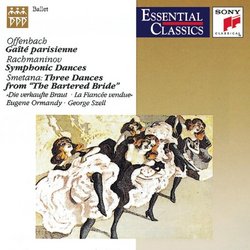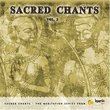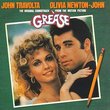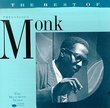| All Artists: Jacques Offenbach, Sergey Rachmaninov, Bedrich Smetana, Eugene Ormandy, George Szell Title: Ballet Music by Offenbach, Rachmaninov, & Smetana Members Wishing: 0 Total Copies: 0 Label: Sony Original Release Date: 1/1/1993 Re-Release Date: 2/23/1993 Genres: Dance & Electronic, Classical Styles: Opera & Classical Vocal, Ballets & Dances, Ballets, Historical Periods, Modern, 20th, & 21st Century Number of Discs: 1 SwapaCD Credits: 1 UPC: 074644827927 |
Search - Jacques Offenbach, Sergey Rachmaninov, Bedrich Smetana :: Ballet Music by Offenbach, Rachmaninov, & Smetana
 | Jacques Offenbach, Sergey Rachmaninov, Bedrich Smetana Ballet Music by Offenbach, Rachmaninov, & Smetana Genres: Dance & Electronic, Classical
The Philadelphia Orchestra was Rachmaninoff's favorite band. He conducted them himself, and formed a close working relationship with both Leopold Stokowski in the 1920s, and then with Eugene Ormandy. He was reported to h... more » |
Larger Image |
CD DetailsSynopsis
Amazon.com The Philadelphia Orchestra was Rachmaninoff's favorite band. He conducted them himself, and formed a close working relationship with both Leopold Stokowski in the 1920s, and then with Eugene Ormandy. He was reported to have been very disappointed when Ormandy gave a cool reception to the opportunity to conduct the Symphonic Dances premiere, and Ormandy didn't make this recording until a couple of decades later. It's most notable for the typically rich and lovely string sound that Ormandy draws from his players. While other performances may be more exciting, this one does have a certain idiomatic stamp which, at budget price, is worth a listen. --David Hurwitz Similar CDsSimilarly Requested CDs
|
CD ReviewsDedicated to Ormandy and the Fantasic Philadelphians Interplanetary Funksmanship | Vanilla Suburbs, USA | 12/17/2002 (4 out of 5 stars) "Eugene Ormandy learned how to conduct Rachmaninoff at the composer's very feet. In fact, the Symphonic Dances -- Rachmaninoff's last piece -- were written for and dedicated to his favourite conductor and orchestra, Ormandy and the Philadelphia. During his own lifetime, Rachmaninoff was treated with a mixture of contempt and patronizing humor by music critics who considered his work as banal and outdated. There were some conductors of vision (Ormandy, Stokowski, Koussevitzky, Mitropoulos) who saw the originality and beauty in his music, and were able to impart it to the public (who were always at odds with the finicky, more "cultured" critics) who have always adored Rachmaninoff's unabashed romanticism. Symphonic Dances is much more complex and dark work than its title implies. The dances are not written as disconnected "episodes," but have a progression from lushness to despair to longing to exhilaration that fits within the framework of a three-movement concerto for orchestra.Ormandy and the Philadelphia refrain from giving this piece a hurried tempo, conservatively and incrementally building up to the climax in the middle of the third movement. This is in keeping with the composer's own method of performing in which he - whether as pianist or conductor - would find a composition's acme and basically ascend to and descend from it. Ormandy's methodical tempo nonetheless draws out the orchestra, and brilliant flashes of instrumentation pervade this performance, some morose, others con dolce and yet others triumphant.The playing in this recording -- especially in the strings and brass -- is precise, but not without feeling. The opening bars are played almost mechanically on the lower strings, contrasting with the solo clarinet, which fluidly winds its way around the strings' ostinato. The results are masterful. Moreso than any other conductor, Ormandy shied away from bombast and podium calesthenics of other conductors and instead concentrated on the sound of a composition, with all its attendant tonal shadings and color. This is further evidenced by the haunting and melancholic saxophone solo in the second movement.Although I prefer this performance to Ashkenazy's majestic Concertgebouw recording from 1983 (Decca 410-124-2), I only barely prefer the recording itself. In fact, while I uniformly prefer listening to RCA compact disc digital remasterings of earlier analog LPs, SONY has badly outdone even the flat and tinny recordings it inherited from Columbia when it bought out the CBS catalog. The CD is just fine, and tolerable, but for the purposes of this review, I went to the vinyl in order to let the music soak in. When you have to use an old Columbia vinyl pressing to find tonal warmth and depth, something is wrong. From listening to the CD, it sounds as though the master tapes had deteriorated slightly because of the overwhelming tape hiss evident on the CD; Hence, the 4 stars instead of 5.Nonetheless, the CD is still a treasure unto itself, and an brilliant example of the meticulous touch Ormandy laid upon the works dearest to him. For those who consider Symphonic Dances as the culmination of Rachmaninoff's symphonic communication, this recording is an excellent companion to Ormandy's Columbia performances of the 1st and 3rd symphonies and his RCA release of the 2nd ." Great performances at a Bargain Basement Price! Doug - Haydn Fan | California | 11/05/2005 (5 out of 5 stars) "All these are outstanding perfomances. The Szell leadership in the Smetana is exciting and echt Cleveland. The Offenbach is also quite good, though I prefer Fieldler. However the best thing about this issue is the Rachmaninoff Symphonic Dances. Ormandy never makes things too difficult, he just lets the orchestra have its way and allows the melodic themes to unfold as fully as possible. Given the full majesty of the most sonorous orchestra in the world, the listener is allowed to literally bath in an unmatched sonic magnificence. Despite the astonishing heft and weight to the orchestra's sound Ormandy never lets them loose sight of the dance elements, and the basic propulsion is remarkable considering the fullness of sound. (You might try the opening 1 minute preview of the first Dance - the first full fanfare is unforgettable.) Because the Philadelphians give such a good account of themselves I see no reason for anyone to look elsewhere, and certainly there should be absolutely no reason to spend three times as much for the equally highly regarded performance by the Dutch orchestra. If you have never heard the Philadelphia Orchestra this is a good introduction. The sound is much more colorful than the Decca version, which presents a darker, and to my ears, sometimes overloaded and murky tapestry. And yes, the LP version of the Ormandy is better, I own it. But for most people this bargain CD should be just fine. " Danzas y ballet de lo mejor.... felipe | Chile | 09/30/2004 (5 out of 5 stars) "Ormandy se lleva el mérito de estas grabaciones, Szell hace un pequeño aporte, las tres primeras danzas son pequeños trozos musicales extraidos de "La novia vendida" de Smetana, son sin lugar a dudas unas pequeñas piedras preciosas, George Szell es alegre, energico y casual, nada mejor para este tipo de piezas.
Pero luego de esa introducción Ormandy se hace cargo de una obra de peso pesado, las "Danzas Sinfónicas" son tres piezas increibles, que van de lo inusual para llegar a lo inesperado, son grandiosos momentos musicales llenos de fuerza y vigor, se embarcara en un placentero viaje por un mar calmo y la tormenta lo alcanzara, vivira la alegria de un momento de gloria y la inmensidad del desconsuelo lo llevara a la pureza del silencio asolador. Son danzas pero conllevan en si majestuosidad y pulcritud, tienen momentos de fulgor y oscuros pasajes de profunda decadencia. Rachmaninov estrenó esta obra con la orquesta de Filadelfia en los 40's, y años mas tarde Ormandy la revivió en una grabación inigualable. Termina esta recopilación con momentos banales de alegria inconmensurable, la vida parisina de Offenbach es felicidad, alegria, libertad, entretenimiento y liviandad manifiestamente incontrolable, es energia pura. Eugene Ormandy es un director que logra con su orquesta el sonido mas impecable que jamas pueda oir, las danzas sinfónicas estan en su mayor logro y Offenbach ni siquiera en Paris hubiese sonado mejor." |

 Track Listings (15) - Disc #1
Track Listings (15) - Disc #1







![Christmas with the Mormon Tabernacle Choir [CD + DVD]](https://nationalbookswap.com/cd//m/49/9049/189049.jpg)

